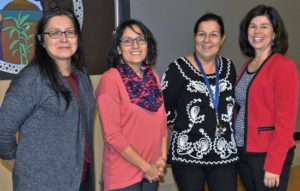Indigenous Interprofessional Primary Care Team to offer traditional programs to support First Nations

By Kelly Anne Smith
NORTH BAY—Indigenous peoples in the Nipissing-Timiskaming region will have access to a full range of health care services now that an Indigenous health care team has been developed.
Full-service health care has historically been missing for most of the Indigenous population in the Northeastern region. With the Indigenous population rising, it is welcome news that a plan is now in place for the new North Bay Indigenous Interprofessional Primary Care Team to fill the gaps in health care.
A health care team will travel to the First Nations of Nipissing, Dokis, and Temagami and there will be an office in North Bay in a new Indigenous Community Hub. The First Nations are the founding partners along with the North Bay Indigenous Friendship Centre.
Primary health care will be available at the medical centre on the upper floor of the former Dr. MacDougall Public School building, while an EarlyON Learning Centre and a day care centre are planned for the main floor.
A community presentation was held recently at the North Bay Indigenous Friendship Centre. Participants heard that the Interprofessional Primary Care Team will take a traditional Indigenous approach as well as a western approach with a team of traditional healers, a family physician, nurses, workers in social work and mental health and addictions, a dietician and a health care navigator.
The new North Bay Indigenous Interprofessional Primary Care Team will serve 5,500 Indigenous people from the Nipissing-Timiskaming region. The priority population will include status and non-status First Nations, Inuit, and Métis.
Health care needs were recognized during community consultations. An important need identified was wanting staff who don’t give up easily and are willing to take the time to get to know them and support them on their individual healing journeys.
Kathy Fortin, the Executive Director of the North Bay Indigenous Friendship Centre, identified traditional services and programming as a high need for the urban Indigenous population for wellness. End-of-life care is also a high priority, as is adult mental health. Fortin expressed the need for a Cree translator for people travelling to the region from the north.
The Director for Health Services for Nipissing First Nation, Kimberly Lalonde, told the gathering that traditional healing has never been fully funded.
“Currently, if you’re residing on-reserve and seeking traditional healing services, to fund those services, you can either access non-insured health benefits, which will cover your transportation if you are seeking in other areas to go visit a healer. However, you don’t receive any support to provide an honourarium or a gift to that healer. There are no funding supports in communities that are specific to traditional healing. This Indigenous Interprofessional Primary Care Team can offer that. There will be staff for traditional programs to support communities.”
“In this area, there does not exist, until this primary care team, funding for primary care services for First Nation, Inuit, Métis, Indigenous and Aboriginal populations. You don’t see physicians funded, so we have to fill that gap.”
Lalonde talked of the primary team travelling to those in need of care.
“The team will travel to Nipissing, Dokis, and Temagami [First Nations]—the founding partner communities to provide those services on reserve where the need is.”
Lalonde said the office at a temporary location in North Bay should be open in January 2019 and will be in use until the renovations are done at the permanent location.
“We are going to be in a temporary place. It is a smaller office and subset of our intended staffing. We should have a physician, an [Executive Director] and a traditional coordinator on site. It won’t be fully operational until the fall when we have our space.”
Staff recruitment is to start soon with positions to be filled by March 2019.
North Bay was chosen for community hub projects along with Hamilton, Ottawa, and Owen Sound. The community hub in North Bay is to provide Indigenous communities with a child and family program and licensed childcare, Indigenous cultural and language programs and services for families.
CAO of the District of Nipissing Social Service Administration Board (DNSSAB), Joseph Bradbury, is pleased with the progress of the Indigenous Community Hub.
“I envision a child being able to hear stories from Elders through the EarlyOn Years Centre. That programming is important, so the culture is being taught at a very early age versus later on, especially with linguistics. It will be phenomenal. It’s about making sure that culturally led services are available in our community.”
Bradbury says The EarlyOn Years Centre is going to be huge with the building sized at over 26,000 sq. ft. There will be spaces for 87 children in the childcare centre and 18 people will staff the EarlyOn Centre. A large playground exists and there are plans for traditional areas such as a fire pit.
“The building permit has been issued,” informed Bradbury.
The North Bay Indigenous Community Hub retrofit is to be funded federally, provincially, and municipally for $5.2 million.


